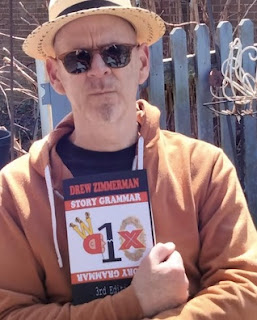It is not every book that attacks a specific social ill with such persistence as does Story Grammar. We follow our narrator, Philadelphia teacher Dex Matherson as he strains to impart the knowledge needed to read and write to urban poor kids who are admittedly not shown in their best light. Why can’t these kids write a thoughtful essay on Ellison’s Invisible Man? This is a thankless job and our protagonist suffers from the strain. His task is made more difficult by his own self-inflicted monomania and perhaps an over zealous commitment to the impossible task. Battling systemic ignorance he takes seriously. This teacher’s insistence of the importance of the English language (now called literary imperialism) throughout never lets up and the reader wonders if sentence structure is worth the trouble?
Dex suffers but he makes his students suffer as well, literally. He begins in a haze of zealous dedication to remove obstacles and is propelled to take action outside of class. These are uncomfortable moments. Curiously, the book makes demands on the reader in the same way the besieged teacher makes demands on the students when offering Dexter’s bonus points and demerits. Zimmerman’s powerful prose propels this novel and serves as a sort of proof of the thesis: language improves the mind. Literary echoes prevail in Story Grammar even as the canon diminishes. There is a whiff of Poe telling his tale and meting out punishment. There is a Raskolnikovian admittance to his senseless crime.
The visual clues about playing cards (the murderer's calling card) run through the book. It is intriguing to think one can apparently find a whole deck of cards one by one on the rough street of this city. A Philly thing? It may take a year to find them all and this implication of chance or randomness is never fully explained. Generation gaps are also on display here. Dex and his Foghorn Leghorn mug (full of sweet warm soda) make constant reference to them and this perhaps weakens his case. How does a cleverer-than-boots “Baby Boomer” possibly ever hope to connect with oppressed POC (the awful new acronym foisted on us) born in the Nineties. “Shah-ki-rah” and her friends have other fish to fry. Zimmerman’s hero is not afraid and pulls no punches. This is topical in an era where literary worth itself is under siege and subject to political trends and freakish ideology. We are asked to choose sides. Are we the banners of progressive material in elementary schools? Or the book burners, the ones who view classic literature as colonial onslaught? What’s a reader to do? Without Melville and Twain we are nothing!
Story Grammar is not a book for the squeamish or literary faint of heart. There is no mealy mouthed place to hide. Neither is there a wishy-washy reprieve for students regardless of their state of underclass-ed-ness. You can only get so far “code-switching.” Is it as simple as choosing “evil” Middle class values over Ghetto-culture? Some readers may feel Dex’s anger and frustration. Perhaps students should lose the “doo-rags” and don the occasional blue blazer? According to Dex, his students are free to improve themselves and they fall short.
Today, in our attempts to level playing fields, we make excuses for shortcomings across the board, ever increasing the lowest common denominator. Thank goodness Mr. Zimmerman sticks to his guns. With his amazing gift for satire, I suggest he write a sequel that attacks wider issues. Somebody has to warn of us of the woeful ignorance and close-mindedness that is swamping our boat and few are brave enough to try. Story Grammar is one brick in the wall!


3 comments:
It's always a great pleasure to read a literary reaction from an qualified reviewer, somebody with their own voice and the means to express complex ideas. This reviewer's superpower is speaking for himself on purpose while speaking for everyone else by accident.
I like this comment. Accidental Speaking!
Another cartouche!
Post a Comment